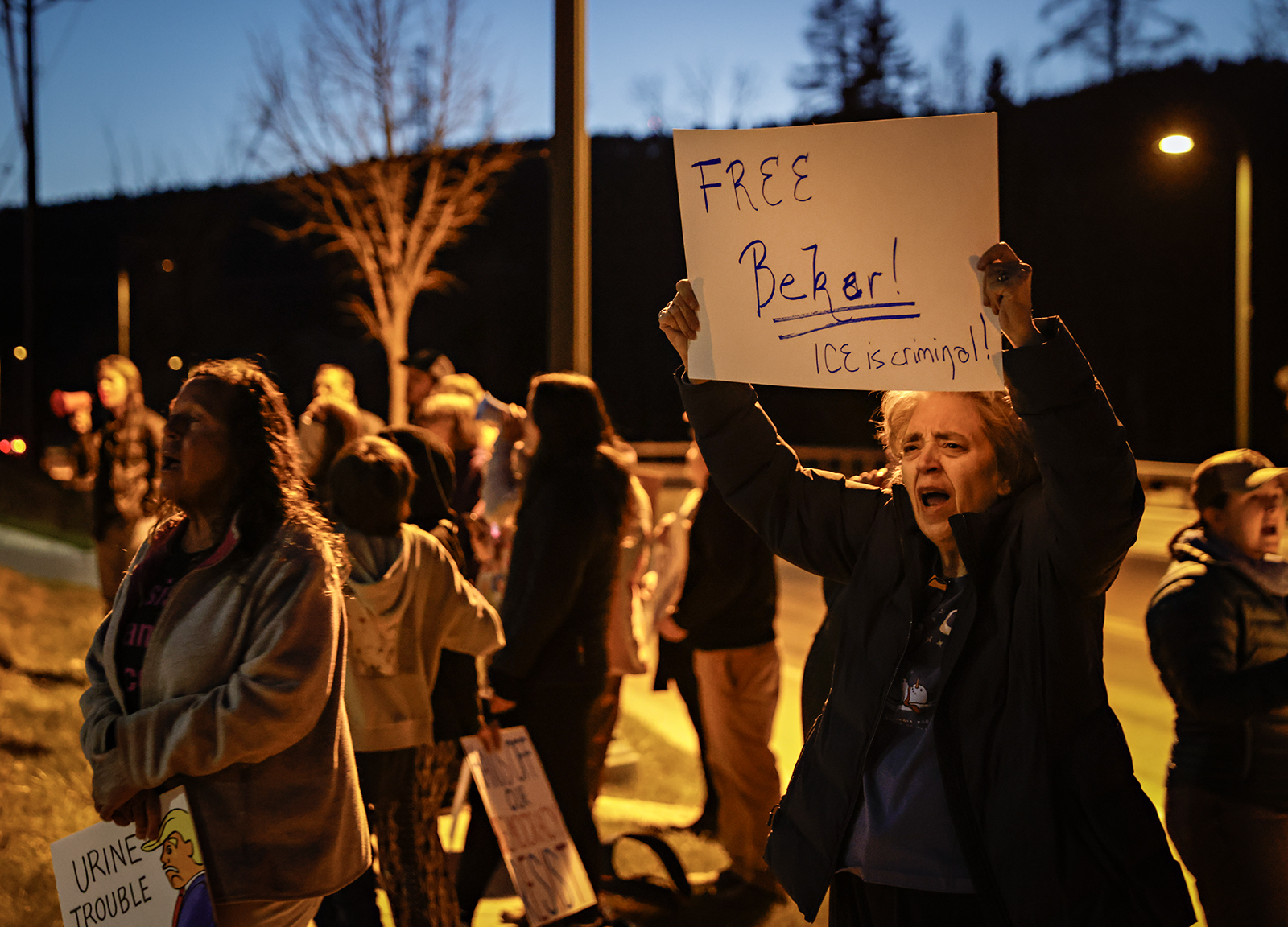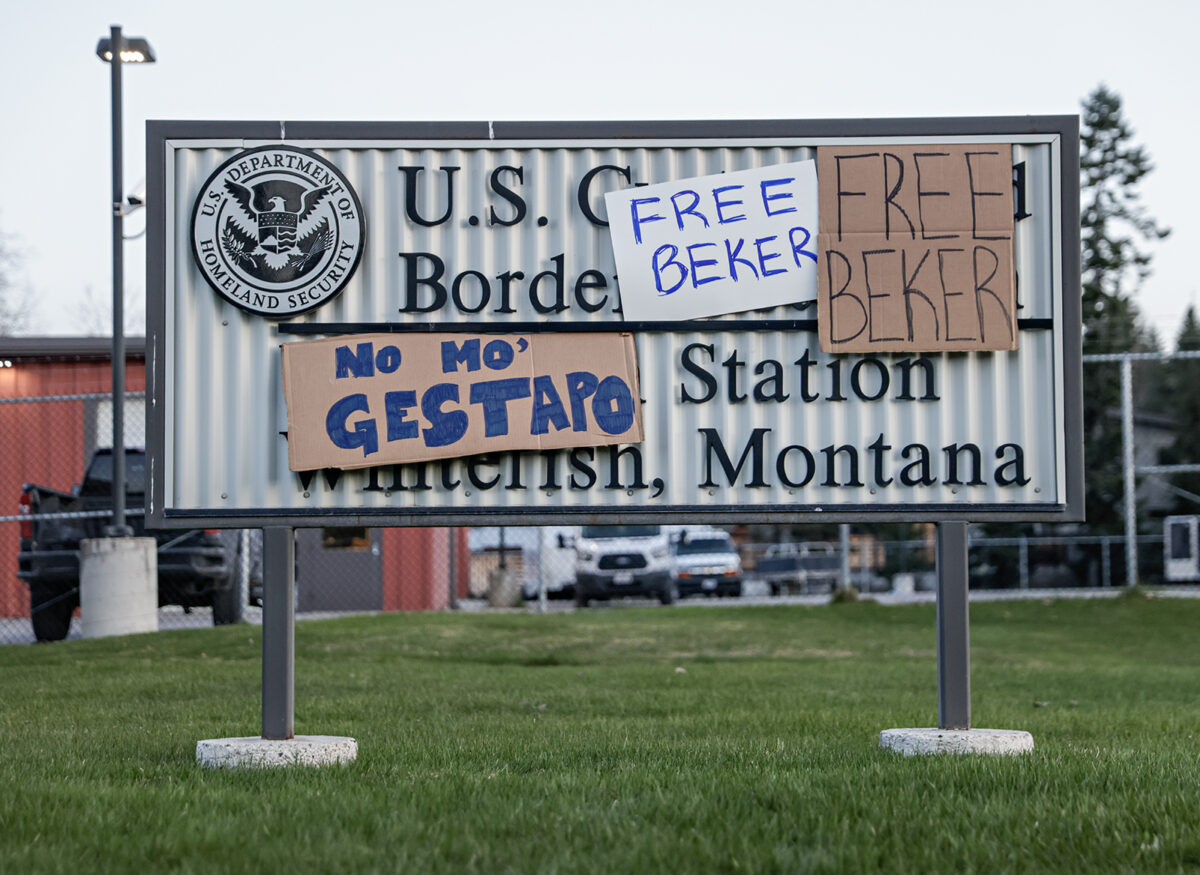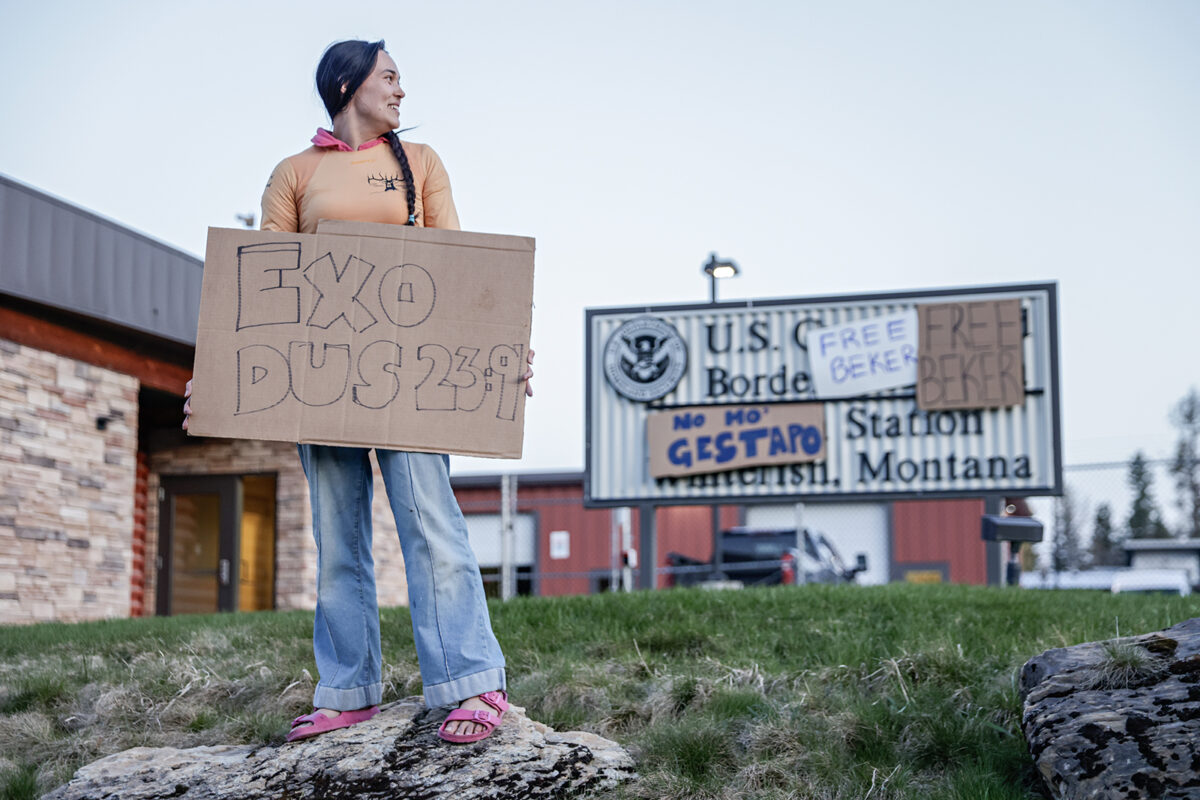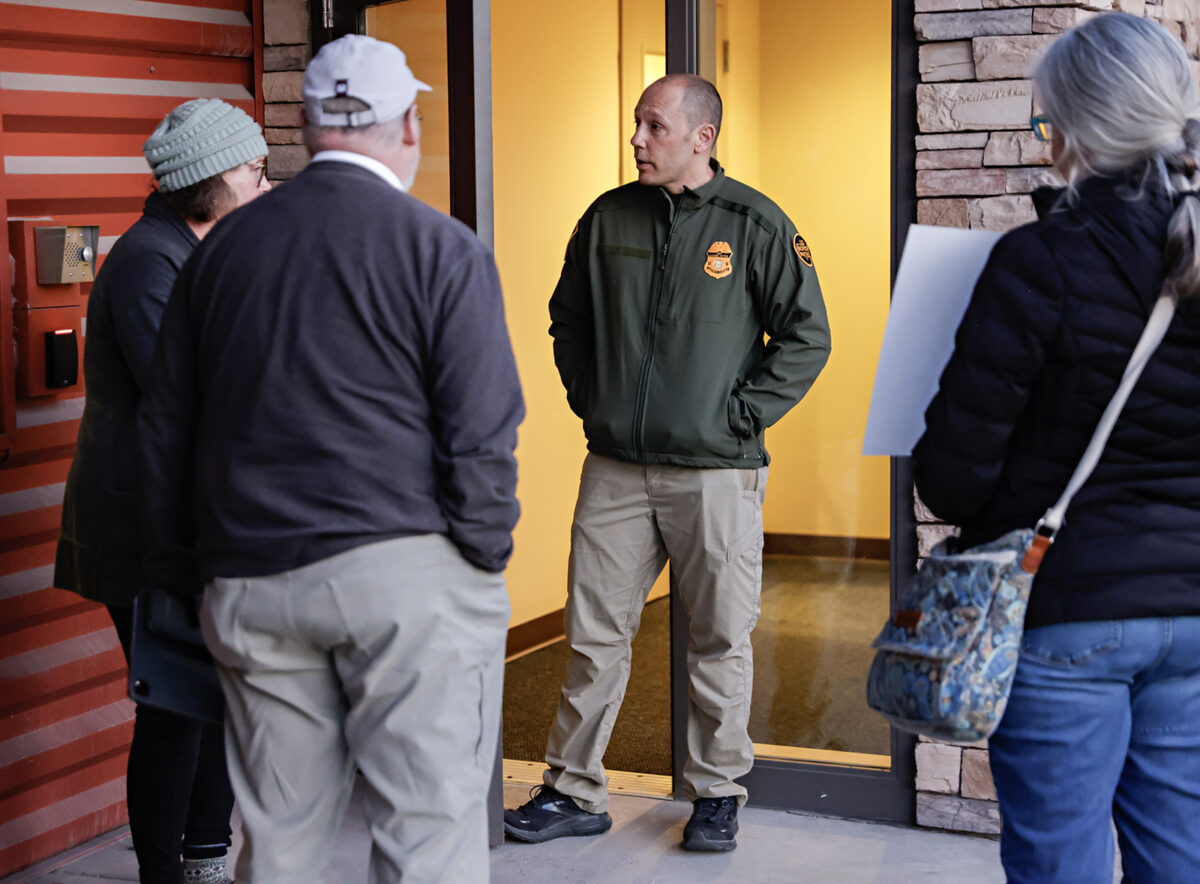Attorney: Venezuelan Man Detained in Whitefish had Legal Authorization to Live in U.S.
The April 24 arrest of Beker Rengifo-Del Castillo runs counter to a judge’s order staying the Trump administration’s move to revoke humanitarian protections for Venezuelan refugees seeking legal status. In Whitefish, protesters have assembled daily to demand Del Castillo’s release.
By TRISTAN SCOTT and ZOË BUHRMASTER
A 33-year-old Venezuelan man arrested in Whitefish last week entered the United States legally after meeting national security and public safety screening criteria in July 2024, according to an immigration attorney who has reviewed the man’s case. The man, Beker Enrique Rengifo-Del Castillo, had been authorized to live and work in the Flathead Valley until July 2026 under the rules of a federal humanitarian program while his application for asylum or other legal status is processed.
On April 24, Del Castillo was arrested during a traffic stop in Whitefish and subsequently detained at the local U.S. Customs and Border Patrol (CBP) office on the edge of Whitefish. That night, as protesters gathered outside the CBP office to demand the man’s release, Del Castillo was transported to the Immigration and Customs Enforcement’s (ICE) Northwest Detention Center in Tacoma, Wash., where he remains “in CBP custody,” according to ICE’s online detainee locator system.
Andrea Sweeney, a Missoula-based attorney reviewing the case, said she spoke with Del Castillo twice last Thursday night while he was detained at the Whitefish CBP office and had limited contact with him over the weekend. Sweeney described Del Castillo’s arrest as the first instance that an individual living legally in Montana “for urgent humanitarian reasons” has been arrested and detained.
“Beker is the only one I am aware of where someone in a lawful status has been picked up and detained like this,” said Sweeney, with Kolko & Casey, a Colorado-based firm that specializes in immigration law. “We’re aware that other people have been picked up and detained during raids in the Flathead Valley area, but to my knowledge they hadn’t been granted legal entry through the humanitarian parole program.”
Neither ICE nor CBP responded to numerous emails and phone calls over multiple days by the Beacon requesting comment.
Sweeney said that although her contact with Del Castillo has been minimal since his arrest, on Monday she sent him a G-28 form, a document the Department of Homeland Security (DHS) requires individuals in its custody to sign in order to consent to legal representation, using an online portal. Sweeney said she was working Monday to find Del Castillo legal representation in the Tacoma area, and instructed him to request “a credible fear interview” to avert deportation.

“Beker has been in the U.S. less than two years so it’s really important that he is given the opportunity to vocalize, preferably before a judge, a credible fear of being returned home,” Sweeney said. “He entered lawfully. He has no criminal record anywhere in the world. He is here through valid status and had a pending affirmative asylum application. So for someone in a legal status it is just really concerning that he would be detained at all.”
Despite Sweeney’s efforts to “communicate that to the officers and determine what right they had to hold [Del Castillo] in custody, I still have not been given any clear explanation or reason why they are detaining him.”
According to Rebecca Miller of Valley Neighbors, a volunteer-run 501(c)(3) nonprofit organization that offers support to refugee and immigrant families in the Flathead Valley, the organization’s members had worked with Del Castillo as a client when they received word of his arrest last Thursday evening and urged supporters to gather at the CBP office on the edge of Whitefish.
“It was a rare opportunity that we were able to know in time to intervene,” Miller said. “A lot of times we don’t.”
Within an hour, several dozen community members were standing guard outside the facility, holding signs demanding Del Castillo’s release. Leanette Galaz, a local human rights advocate who’s been organizing events under the aegis of a group called Flathead Democracy, said the Trump administration’s disregard for the legal status of immigrants prompted her supporters to develop an “ICE neighborhood watch.”
“We are 100 percent organizing over this particular issue, and while we are determined to bring Beker back, this is bigger than Beker,” Galaz said, describing the scope of a nationwide deportation blitz orchestrated by the White House. “He is the unfortunate person caught in the crosshairs of this moment, but it looks as though we are in a constitutional crisis where the law enforcement agencies get to decide who their allegiance is to, a constitution or a dictator.”

Paul Leisher, a Whitefish attorney who’s been offering legal consultation to local citizens’ rights groups alarmed by the local arrests, said the timing of Del Castillo’s case is unique in that it comes 10 days after a federal judge signed a preliminary injunction staying the Trump administration’s attempts to revoke the protected status of tens of thousands of migrants living and working in the U.S. legally on “humanitarian parole.”
As a statutory provision, “humanitarian parole” gives the executive branch — specifically, the Secretary of Homeland Security — the discretion to permit individuals on a case-by-case basis to enter and remain in the United States for “urgent humanitarian reasons or significant public benefit,” according to the statute. Republican and Democratic administrations have exercised parole authority for 70 years, including programs for Vietnamese and Cuban nationals. Afghans were granted parole after the 2021 withdrawal and evacuation of Afghanistan, for example, while the Biden administration also announced a Uniting for Ukraine (U4U) parole program for U.S.-based sponsors to apply for Ukrainian nationals to receive travel authorization and parole to the United States.
According to Sweeney and Leisher, these examples demonstrate a longstanding commitment to affording asylum-seekers access to temporary protection. In October 2022, the Biden administration renewed that commitment with an initiative to address the volume of Venezuelan nationals arriving at the southern border by “coupling a meaningful incentive to seek a lawful, safe and orderly means of traveling to the United States with the imposition of consequences for those who seek to enter irregularly.”
The program instructed that those “who are not granted asylum or other immigration benefits will need to leave the United States at the expiration of their authorized period of parole or will generally be placed in removal proceedings after the period of parole expires.”

In early 2023, DHS implemented similar processes for nationals of Cuba, Haiti and Nicaragua in addition to Venezuela (CHNV), lumping the countries together under the “CHNV humanitarian parole programs” umbrella.
Although the Trump administration on Jan. 20 instructed DHS to end the program and revoke the temporary protection it afforded tens of thousands of CHNV parolees, a federal judge in Massachusetts on April 14 signed a preliminary injunction in a lawsuit challenging the Trump administration’s widespread rescissions of migrants’ legally granted parole status.
The Trump administration appealed the judge’s order to the First Circuit Court of Appeals, which is awaiting a response brief from the plaintiffs, who joined the case as a civil action to defend their CHNV status.
Meanwhile, federal agencies such as ICE and CBP, charged with enforcing immigration law amid a succession of contradictory notices to the Federal Register, have had to pivot following the Massachusetts judge’s recent order. That includes walking back the parole termination notices “that were sent to aliens from Cuba, Haiti, Nicaragua, and Venezuela” which the agency conceded “are stayed and therefore not currently in effect.”
Leisher, the Whitefish attorney, said it’s possible that, given the pace of policy changes, there have been oversights in enforcement.
“Did the Border Patrol grab this guy because they didn’t get the word to stop grabbing people who are here under those CHNV grants of parole? Could it be that they didn’t get the memo?” Leisher said. “Or is it because the Trump administration believes they can deport his guy and then there will be no recourse to bring him back?”
According to Sweeney, Del Castillo received his two-year grant of parole in April 2024 and obtained a work permit in July 2024, extending his rights to protection until July 2026. She did not know whether Del Castillo had received a parole termination notice. If he did, Sweeney said it runs counter to the terms of his immigration status and the judge’s injunction.
“His continued detention is unlawful,” Sweeney said. “He received permission to remain in the country for two years from U.S. Citizenship and Immigration Services while his application for asylum is pending.”